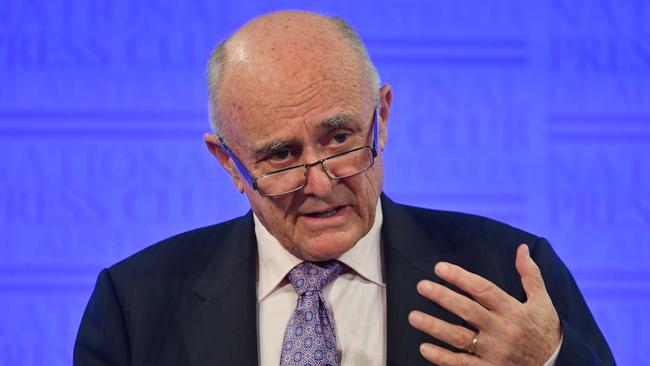Coronavirus: Open up domestic aviation industry to foreign firms, says Allan Fels
Allan Fels says the domestic aviation industry needs to be opened up to international competition if Virgin collapses.

Former competition tsar Allan Fels says the domestic aviation industry needs to be opened to international competition if Virgin collapses, as new calls emerge for the removal of barriers preventing foreign carriers from servicing domestic routes.
Professor Fels said cabotage restrictions should be eased if Virgin were to fold but limits should be placed on the number of flights available to international competitors so as not to threaten the survival of Qantas.
“If Virgin goes, we will need to liberalise entry to foreign airlines, but not totally open up,” he said.
“The dilemmas now are the same as in 1944 when in Chicago the current system was established. The dilemma was that open entry into the war weakened airline system around the world would mean there were no national airlines, only a few prominent global players,” Professor Fels said.
The head of the Australian Competition & Consumer Commission when Ansett ceased operations in the early 2000s, Professor Fels said it would be difficult for a new player to enter the market if Virgin failed but Australia needed two major airlines.
The current head of the competition watchdog, Rod Sims, on Thursday said it was up to the federal government what to do about a proposal from Virgin for financial support through a $1.4bn loan instrument that could be converted to equity if repayment of the debt could not be met within three years. “We desperately need two full-service airlines, not half-service, airlines when this is over, and this is unusual times,” he said.
“I don’t think there’s any rules. Whatever the government does, by me, is fine. It’s their decision.”
In 2015, a major review of competition policy chaired by Ian Harper for the Abbott government also proposed loosening air cabotage restrictions for remote and poorly served domestic routes, saying there were “considerable benefits” to the move.
“A foreign-flagged flight originating in Malaysia and travelling to Darwin and then on to Sydney cannot embark domestic passengers for the Darwin to Sydney leg, yet an Australian international carrier flying the same route could embark passengers for the Australian leg,” it noted. It found the “current blanket air cabotage restrictions” were inefficient, arguing for the introduction of an air cabotage permit system.
Christopher Findlay at the University of Adelaide also told The Australian it was time to “start asking some fundamental questions about why we do things the way we do them. Why do we have a regime that inhibits the opportunity for international carriers to come into the domestic market? If you want competition, you are surrounded by potential entrants.”




To join the conversation, please log in. Don't have an account? Register
Join the conversation, you are commenting as Logout